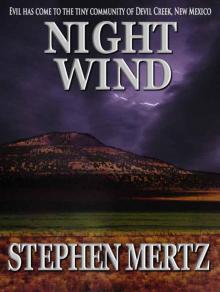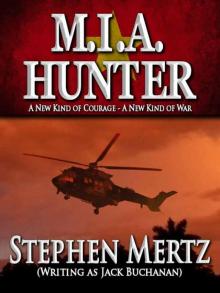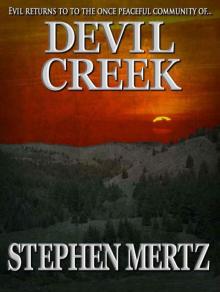- Home
- Mertz, Stephen
Devil Creek Page 3
Devil Creek Read online
Page 3
Muskie glanced up and down the gravel road that curved around the side of the mountain, continuing to remind Mike of a squirrelly groundhog. He was a wiry guy with a narrow face that was severely pockmarked from some ancient childhood affliction. He looked wholly out of place up here on this mountain, wearing corduroy slacks, penny loafers and a yellow sleeveless sweater worn over a button-down, short-sleeve blue shirt.
As he drew closer, Mike could see that Muskie was more than wary. His eyes were trying to skitter everywhere at once.
He looked as if the hounds of hell were on his trail.
Chapter Five
Del Muskie sometimes bussed tables at Donna’s. On the basis of that alone, he and Mike had formed a nodding acquaintance, the way small-town folks do when encountering a familiar face in town.
“Thanks for coming, Mike.”
“What’s up, Del? You look scared out of your wits.”
A breeze ruffled the aspen leaves overhead. A hawk took wing from somewhere nearby and soared out over the drop-off, the unhurried, steady flap of it wings sounding confident and assured in the crisp silence.
Muskie’s eyes skittered after the hawk before returning to skitter about the terrain. “You saw them guys in that pickup truck. You saw them rifles in the rack? Them rifles shoot real bullets, Mike. And them two guys ain’t alone. There’s a whole dang security staff, they call it, over there,” and he nodded in the direction of the construction site. “Thugs, is what they look like to me. Big city hoods, good at busting kneecaps and worse. I been around. I seen their kind.”
Mike was inclined to agree.
Like most residents of Devil Creek, he had mixed emotions about the resort that was being built on the outskirts of town. On the one hand, it would be good for the local economy. “A great boon,” was the way one letter-writer to The Clarion had put it, and correctly. And yet such “progress” inexorably and irreversibly changed much about a town’s personality that so endeared it to those who lived there: the untrodden natural surroundings, the absence of intrusion from the outside world. And yes, he had gotten the same reading on those guys in the pickup.
He said, “But Del, why would they want to shoot us? What have you done now?”
“Me?” The wiry, wired little man saw no humor in this. “I ain’t done nothing! It’s what I heard, and what I know.”
“How long were you hiding over there, while I stood here waiting?”
“You won’t be mad?”
“I’m already mad.”
Muskie’s beady groundhog eyes skittered to the ground. “Sorry.”
“I’ve got somewhere else I should be. Today is my first wedding anniversary.”
“Damn, I’m sorry, Mike. I guess we could’ve met tomorrow. But it just happened today.”
“What happened? You said you had something to give me. What have you got? And why did you want to meet me up here like this?”
“Figured it was safer. No one will see us up here, as long as we dodge those damn patrols. And after I give you what I’ve got, I want to take you to show you what I found. I did me some snooping around on my own, after I got me a whiff of what’s going on.”
Mike felt one of his eyebrows raise. “Snooping around? Is that why you look scared out of your wits?”
Muskie wiped at his mouth with the back of his hand. A nervous gesture. “I’m scared because I wish I’d never gotten involved in this in the first goll-dang place. But Mike, I think I’ve got that lead you’ve been trying to find.”
“Well then, let’s see it.” Again he heard his voice snap like a whip of impatience.
He’d made no secret around town that he was interested in the goings-on at the Sunrise Ridge site. A development company, based in Chicago, was putting up a lodge with rec center, health spa and one-hundred forty units. The ski runs were being cleared and readied in conjunction with the construction of another seventy condominium units intended for semi-permanent residents, built overlooking what was intended to be a world-class eighteen-hole golf course.
Naturally, a construction project as monumental as Sunrise Ridge required a vast number of carpenters, electricians, heavy equipment operators and assorted able-bodied workers. The vast majority of this work force came from Devil Creek. The resort’s construction was indeed a “great boon” to the local blue-collar economy. But people were beginning to ask if it was worth it.
There had been three job-related accidental deaths on the worksite so far. It seemed as if the town would only begin to heal, grieving for one loss, when another fatality occurred.
Bill Blaswell was knocked off a girder by a freakish gust of wind while readjusting his harness.
Tony Montoya had just delivered a truckload of cement and was standing behind his truck, waiting on the foreman for instructions, when the safety brake accidentally released and the truck rolled over him.
Nanci Cline was the hardest for the community to take. Nanci was a twenty-one-year-old single mother of two trying to make ends meet, taking classes to become a computer programmer and picking up some extra wages working in the administration trailer. She had been sideswiped from behind by one of the big graders in a freak accident, and the operator had suffered a mental collapse as a result.
The question on everyone’s mind and lips: Were these tragedies the result of a systematic flaw, pushing workers too hard to meet the oft-stated deadline of Thanksgiving, in time to capitalize on the ski runs? That was a few months away, but there was big, really big, money involved … and people were talking. So Mike was investigating, and not learning a damn thing yet that would tie any of those three deaths together, to make them anything more than unrelated, tragic accidents.
No one was suggesting that this cluster of tragedies was anything but accidental and coincidental. But people still wanted some rational explanation for how such a thing could be.
The construction manager at the site, a hearty, gruff, but cooperative guy from Chicago named Olson, was cordial enough on the three occasions that Mike went to interview him, after each of the deaths. But Olson had seemed as genuinely perplexed as anyone about this run of bad luck.
Then today, came Del Muskie’s call.
Mike was starting to wonder if he hadn’t made a mistake, making himself late for his and Robin’s celebration for … absolutely nothing. If that proved to be the case, his impatience would become an emotion he didn’t feel very often, but which could be summoned if justified.
The noticeable chilling of the air was in direct proportion to the sun lowering behind the mountain. Shadows lengthened. Shadows of the mountain broadened across the flat at its base, to engulf the rectangle that was Devil Creek far below. Much closer, a rabbit hopped into sight, onto the gravel road, didn’t like what it saw and hopped right back into the brush.
There are always guys like Del around in small towns, Mike had come to realize, especially in isolated western communities like Devil Creek where they stood out more. They weren’t drifters exactly, and for the most part paid their own way. But they were folks who couldn’t seem to get their standard of living much over the bare subsistence level. They were the dishwashers and the guys unloading the crates on the docks and behind the warehouses across the nation. Torn and frayed, but with strong hearts. Taken some tough blows in life and showing it, but not down for the count. These were the Del Muskies of the world, and Mike knew that in the world today, there were too many female counterparts surviving in similar situations.
As with every level of society these days, there were opiates aplenty at Del’s “street-level” world. He hoped that this was not some pathetic hustle by Del for drug money.
Del reached into a pocket. “Okay, here. You want to see what I brung you?” His words grew rushed, eager. “Here it is. Right here.” He brought forth an audiocassette tape. “Play this and you’ll know where to start nosing around. And I can show you.”
Mike took the tape, turning it over for a cursory glance at each side. Strips of white tape. Neat b
lock handwriting in magic marker in what he assumed was Del’s handwriting. Alan Jackson on one side, Patty Loveless on the other.
“What the hell is this? I already like country music, Del. You don’t have to—”
“Yeah, well, some people don’t. Mr. Olson for one. Now do you want to hear what I’ve got to say or not?”
“I’m sorry, Del. Go ahead.”
Muskie’s eyes had their accustomed glaze from who knew what, but he appeared steady, not strung out.
He said, “I feel so bad for Marietta. You know, that Mexican girl waits tables at Donna’s. We make conversation during slow times, and we’ve gotten to be friends. Nothing, uh, intimate, you know. She’s a good girl. I’ve just come to like her a whole lot, she’s good people, and I feel just terrible over what happened, and seeing what she’s had to go through.”
It was Marietta’s husband, Tony, who had been crushed by his runaway cement truck.
Mike nodded. “I know Marietta. She’s waited on me lots of times. You’re right, she’s a nice girl and what happened to Tony was a damn shame.” He gestured with the cassette. “Now, what’s she got to do with this?”
“Nothing I’m just saying I felt bad about what happened to Tony, and like a lot of folks I guess I want an explanation for what’s been going wrong up on this mountain. It’s like there’s a curse on that construction site.”
Mike said, “So you’ve been keeping your eyes and ears open around the site because you feel bad for Marietta.”
“Well, wouldn’t you? You’ve got your newspaper, and that makes you the voice of the people. That’s why Mr. Olson is so damn hospitable to you and lets you come in and nose around. But me, I drive the goll-dang lunch wagon! Who’s going to pay attention to little old me, serving up nuked burritos and burgers? Oh yeah, and a salad or two.”
Mike gestured with the cassette yet again. “In the name of humanity, Del, what’s on this tape and why are you giving it to me?”
“All right,” said Muskie. “Short and sweet. I showed up in the truck like usual today and started serving up chow and I’ve got my tunes going on my boom box, you know? I had the side with Patty playing, and I guess I did have it cranked up sort of loud. But most of the boys from around here, why, they seem to enjoy it right enough when I serve them up. Then Mr. Olson and some guy I never seen before come up to the wagon, and they ordered burgers and they were talking while they were waiting on their food. That Olson, he can be an ornery cuss, much as he pretends to be such a nice, caring guy when you’re around. He’s always wearing that black suit with the white shirt and the black tie, and the wingtip shoes. You ever notice how he always dresses the same, and not like folks around Devil Creek?”
“I’ve noticed.”
“He wishes he was back in Chicago. He wishes he’d never left. You can see that in a blink. And I found out for sure that he don’t like country music. He got irritated and told me, and I quote, ‘Turn that hillbilly shit off.’ Well, he’s the boss. And I guess I was a mite flustered because I found out after they left that when I thought I was hitting the Stop button on the tape deck without looking, because I was in such a hurry to get their food up, I was really hitting the Play and Record buttons. Matter of fact, I didn’t even hear the conversation between those two fellas while it was going on, what with two microwaves working and such. But after I realized that I had accidentally erased and re-recorded over some of Patty Loveless, well, I gave it a listen. Then when I went to poking around some before I drove off. If you want to come with me now, I’ll show you what I found.”
Mike pocketed the cassette. “Okay, let’s do that.” He was starting to wish that he’d worn a heavier jacket. “This man you saw Olson talking with. Can you describe him?”
Muskie stroked his jaw thoughtfully. “Like I said, I never saw him before. Sort of average-looking is the best I could do, and that ain’t much help, is it? Let’s see, he was dressed like a city fella, like Olson. I—holy shit, here they come!”
A vehicle could be heard, approaching fast from around the bend. It sounded like the white pickup truck.
Mike said, “I thought you knew their schedule.”
Muskie’s eyes were wide saucers. “Something’s wrong. They’re after us!”
He pivoted and took off running, barely slowing at the edge of the drop-off, then he disappeared from sight. There came the diminishing, scrambling sounds of his frantic withdrawal.
Mike looked at the cassette tape in his hand. Then he looked in the direction where the truck’s rumbling engine and the fat tires on gravel could be heard, seconds away from wheeling into sight around the bend of the gravel road.
What the hell, he decided. He was on private property, and that Security pickup truck was roaring in with too much of a sense of urgency. He didn’t like it.
He pivoted and took off running, not after Muskie but backtracking the way he’d come. He left the road, practically diving into the stand of pines, one heartbeat before the pickup wheeled around the bend. He didn’t slow down, rushing uphill to where the trees grew thick and the shadows of the coming dusk created a dense, cool world that embraced him. He followed the narrow game trail that had brought him here.
Behind him, below on the road, the pickup could be heard braking to a stop. The driver killed the engine, and the world seemed suddenly very quiet. Mike’s footfalls through fallen leaves became excruciatingly loud in his ears. He crouched down low near the ground, getting an angled view of the front third of the snow-white pickup.
The driver leaped down from the cab. He was alone. He held a rifle. Mike thought, Where does that leave security man number two? and he felt a cold cramp grip his stomach, that almost claustrophobic feel he hadn’t known in two years.
The man with the rifle started up the game trail at a loping gait.
Mike continued on up the trail, staying close to the ground, climbing, hoping the angle and the trees and the iffy lighting would conceal him from the rifleman’s line of vision. He couldn’t afford to look back. There was a ridge ahead of him. When hiking from his Jeep to the meet site, he hadn’t been scouting the terrain with any particular idea in mind, merely enjoying his surroundings like he always did in this outdoor environment. But now he knew where he was going before he crested the ridge. He topped the rise and followed the trail a few more yards, then broke from it to descend a rocky slope that was more direct but far more difficult terrain to negotiate than if he’d stayed on the trail. With any luck, the man loping up the hill behind him would stick to the trail. He estimated the Jeep to be a quarter mile away.
His heart was pounding against his ribcage. He wondered how odd it was that his mind should slip so automatically back into a soldier’s combat mode, mentally reviewing options, considering logistics, strategizing. Damn, he thought. And here I thought I’ve been growing fat. But he was out of breath.
His feet slipped out from under him in his haste, and because some smaller rocks slid under his feet when the slope grew even sharper. He broke the fall on the bed of golden leaves with a forearm, decreasing the speed of his descent while he struggled to regain his balance. Then he was hoofing faster than before.
The man behind him had moved like a city person in the brief moment Mike had glimpsed him, like someone ill at ease and unaccustomed to this sort of wild terrain. The rifleman would stick to the trail.
That would buy Mike time to get in his Jeep and—
He drew up short, right where the tree line gave onto the clearing where he had left the Jeep. Beyond this clearing, a wide ravine had provided easy access from the lower part of the gravel road, less than a half mile from where it connected with a two-lane blacktop county highway.
The second man from the pickup—wearing identical khaki, holding a rifle—stood beside the Jeep, holding his rifle at port arms, scanning his surroundings, watching. He whirled when his peripheral vision caught sight of Mike, and he started to track his weapon in Mike’s direction from a distance of less than fifty feet.
>
Mike thought, Holy shit! He would later be amazed at the way instinct sent him, regaining his momentum, and thrust him forward at this rifleman before the guy could bring his rifle around.
Mike sailed into him with a full body slam that sent the man off balance, into the Jeep’s hood. In that instant before the man could regain his balance, Mike twisted and savagely jerked loose the rifle from the man’s hands, using skills that must have remained dormant while not becoming dulled. He stepped aside, holding the rifle, and just as the man did regain his balance, Mike punched him hard in the stomach with the rifle butt. The man doubled over with a grunt. Mike brought up the rifle butt in a sharp swing from down under that caught the man on the jaw and flipped him onto his back. Mike tore loose the ammunition magazine and threw the clip away as far he could into the woods. He ejected the round in the rifle and threw the rifle away.
He leaped in behind the Jeep’s steering wheel. The keys were in the ignition. That’s how sure these guys had been of getting the best of him. He gunned the engine to life, and caught sight of the other man, who was now hurrying down the path, having seen what was happening. He was raising his rifle to fire.
Mike tromped the accelerator and Jeep’s rising engine noise filled his senses. The Jeep jolted forward, pitching up gravel in its wake.
He didn’t hear the shot.
He only heard the whistle of the incoming bullet, loud enough to be heard through the engine sounds of increasing acceleration. The bullet went spang! as it ricocheted off the Jeep’s chassis.

 Night Wind
Night Wind Korean Intercept
Korean Intercept M.I.A. Hunter: Miami War Zone
M.I.A. Hunter: Miami War Zone Castro Directive
Castro Directive Blood Red Sun
Blood Red Sun M.I.A. Hunter
M.I.A. Hunter Devil Creek
Devil Creek